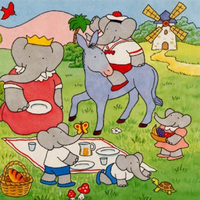Just for fun I wonder where England and the USA would be on this list…
The only people who are likely to take such a test in an anglophone country are immigrants …
Would be interesting to see how native speakers score, though.
If you immigrate as an English speaker to Canada you have to take an English proficiency test even if it is your first language.
I’m guessing you could take French as well, regardless of where you’re going, right? Language equality is serious business.
Yes, unnecessary documentation is very our style. And no guarantee you won’t have to do it again for some other entity. Somehow we’re still one of the easiest destinations to immigrate to.
I’m an immigrant in Germany, and they offered me an integration course when I got my spousal visa. I’ve taught those classes for the same city. They did waive my language requirement because of my master’s degree in German though, so that was nice and unexpected.
They did waive my language requirement because of my master’s degree in German
Yes, we believe in degrees.
To be fair, it’s a master’s in German language education, so it should really apply to the integration course as well (it’s basically a language class that focuses on things like siezten/dutzen, bureaucratic language, holidays, navigating the workplace and shared housing, and cultural quirks like not jaywalking and quiet sundays).
On behalf of Germans, sorry for that. It’s hard to go against the rightwing propaganda machine, but lots of people are trying.
Come to !ich_iel@feddit.org if you want to learn some new idioms Ü
There is a lot of very similar vibes between the Canadian and German government, I’ve noticed. They even both love faxes the same.
Germany finally got rid of faxes in the government recently.
But many of our health insurance companies still use them
Yes, I think you just have to show proficiency in one of the official languages.
I can’t comment for the whole Anglosphere and I certainly won’t comment on NI, Wales, and Scotland, but for England:
Pick any point on the map and move in any direction. As you move, if the average wage increases, English proficiency increases and vice versa.
I’d say at the lowest level equivalent is France and the highest level equivalent is Denmark.
I have a hard time believing that there are regions in England where native English speakers are on the English proficiency level of France. Unless you classify any dialect as “bad English”.
You haven’t been to enough regions of England mate. I’m only slightly joking when I say it can get bad. Not “it’s a difficult to understand dialect” but “how the hell did you even make it through the state school system?” bad. Genuinely some of the first generation immigrants speak better English than some of the locals.
Source: grew up in one of these regions.
I mean, the King’s English is technically a dialect too. It’s just the one on top.
Yes, that’s what a dialect is. Well, thanks for clearing up what you meant.
Also, I’d assume even the heaviest dialect speaker will usually be able to write perfectly understandable sentences in a written test.
Bad native language is when you can’t express a thought better than a 10 y.o. kid. Small vocabulary, …
I wouldn’t expect Scandinavian countries to move much. Most of them learn it to fluency as part of primary education.
Thanks. I was seriously wondering about Italy and Turkey, but that explains it.
If they don’t immigrate (i.e. aren’t in anglophone countries), they might still take the test for domestic purposes like proving their ability to deal with tourists or other international customers to their employers. But the test takers are definitely self-selecting, some rural greatgrandmother who barely learnt to read her native language isn’t taking that test.
I find that broken English is easier to understand, compared to the time I talked to a Londoner in the bus, I could understand him but my travel buddy had no idea.
Accents can be rough on tourists.
It’s known that two non-native English speakers can understand each other more easily than a non-native speaker and a native speaker. The non-native speakers are better at deciphering incorrect use of the language than the native speaker who has stricter expectations.
I wonder what the numbers look like between English first language ‘with no second language experience’ versus ‘some or fluent post-childhood learning second language experience’. Because there are a lot of English only speakers.
I’ve been told im awful to practice English with because i just understand. But i have teen/adult learning experience with two other languages.
I think it has a significant impact, yes. When you understand how different grammatical structures in other languages behave, and if you are even familiar with some of the words from other languages, understanding the speaker’s incorrect English (or other language they are trying to speak with you) becomes much easier. 👍
Yeah i think just having experience with a different grammar at all forces you to be more flexible. When you only talk to other english speakers as a first language, the rules are somewhat rigid in the sense that everyone’s interpretation assumes your intent aligns with what is spoken. If that’s your only experience you might try to apply that assumption with non-native speakers. So I’m suggesting regardless of your knowledge of any particular other language, having learned some of any secondary language in practice forces you to re-evaluate the rigidity of those social rules and think more critically about what an English learner is trying to say.
Exactly, it increases the plasticity of your understanding. Widens your ability to error correct on your own, and understand despite incorrect use.
At work I had to speak my english slow and deliberate with french people when in international meetings, or they would not understand.
The interesting part is that when doing so I picked up the “french accent” in my own English 😅.
I am fully expecting England to not be at the top. Especially if written skills are measured.
England: 1st place
USA: 7th place
- England
- Ireland
- Australia
- New Zealand
- Bahamas
- Nigeria
- USA
Checks out.
There’s a related joke, about the general language skills of populations: the Luxembourgish speak four languages, the Swiss speak three languages, the Swedish speak two languages, the English speak one language and the US-americans speak half a language.
I fully expected England to be in the lowest color and am disappointed that they aren’t on the list at all.
Fake news. Everyone in France speaks English when English speakers aren’t around. They only speak French out of spite.
Everyone in France speaks English the moment an English speaker tries to speak French.
My French sucks. I would intentionally butcher French just so they’d roll their eyes and start speaking English.
French only speak “English”, not English…
That checks out for Quebec as well.
Whenever a few Europeans from different countries come together, there’s a joke that inevitably gets told:
Someone who speaks many languages is multilingual. Someone who speaks two languages is bilingual. Someone who speaks one language is English.
That’s what happens when your language becomes popular enough to become the lingua franca. It would be the same for any other language.
It’s hard, but true.
What is the point of depicting data in this manner? The spatial coordinates have no meaning
The countries are ordered on the bend line according to their rank, so the 1-dimensional spatial coordinate system describing this line does have meaning.
This somwhat unusual representation has the advantage that they managed to represent all datapoints with a well readable font on a graphic that fits well even on a phone’s screen, and it’s sort of eye-catching.
It’s pretty unintuitive, though. I had to actually read and analyse it rather than just view it.
Why not just use a coloured map instead? Presumably that would fit in roughly the same aspect ratio.
Seems made for mobile.
I look at this and I think you know, not everything needs to be a bar chart… this is different, it’s creative, but then again, it would be better as a bar chart.
dataisugly
It would be better as a map.
Yes, you may be right, given how there seems to be some geographic patterns in the level of fluency. A map would show these better. A bar chart would be better for making visible actual absolute differences in scores. But yeah, a map would be good, I agree.
Map with colour gradient is how I would do it.
And maybe a bar graph along the bottom ordered greatest to smallest.
Yes, possibly, for the best of both worlds
Where does the UK and Eire come on this?
It was skewed off the bottom of the scale by scouse.
Yeah the obvious joke is “United Kingdom: DNF”
deleted by creator
It’s hard to believe Germany is so high on the list. I visit regularly and even worked there for a while, where are all the fluent English speakers hiding?
The EF English Proficiency Index (EF EPI) attempts to rank countries by the equity of English language skills amongst those adults who took the EF test. It is the product of EF Education First, an international education company, and draws its conclusions from data collected via English tests available for free over the internet. The index is an online survey first published in 2011based on test data from 1.7 million test takers. The most recent edition was released in November 2023.
So the data is not representative for the entire population of a country.
I don’t know what study these numbers are based on, but many of them only assess certain (typically younger) age groups. In my experience, the people coming out of school today in Germany are often quite good in English.
Edit: Looked it up. The data are not based on any study but the results of test takers that aim to earn a certain language certificate. So no specific age group but still likely younger people. The sample is completely self-selected, though, so it’s hard to say anything definitive. From the Wikipedia page:
The EF EPI 2024 edition was calculated using test data from 2.1 million test takers in 2023. The test takers were self-selected. 116 countries and territories appear in this edition of the index. In order to be included, a country was required to have at least 400 test takers.
And more:
The EF English Proficiency Index has been the subject of criticism in literature. From the point of view of methodology, it suffers from self-selection bias. Instead of testing the level of English proficiency in the population, it tests the level of English of those who self-select.
This seems like a very poor basis for a country ranking.
Currently in university or so, and there is a large countryside vs. city gap.
In my experience there has been a relatively recent massive improvement in English skills by the younger generation. Anyone 35+ is still very much behind though. As an elder Millenial myself, it actually caught me on a wrong foot carreerwise as being able to speak English well is no longer considered to be a selection criteria for many jobs, because so many can do it and it is assume a given.
I guess this (and the data being from a very selected part of population ie. test takers) would explain my experiences with Ruhrpott folks of around 30 to 70 years of age. I’ve met many people in their late thirties, some who even work in universities, unable or very uncomfortable in speaking English.
Same with Austria. As a Dane living in Austria, it feels like nobody here has even half-decent English skills. It’s horrible, and I blame generations of dubbed TV and movies.
Where in Germany? This coulf be a latent East/West divide.
Ruhrpott and Düsseldorf.
Really? Nearly everyone I met there spoke excellent English…
I’m also confused. Maybe they just don’t want to talk, that’s the best explanation I have.
deleted by creator
The uk didn’t even make it on the list, how embarrassing.
Was curious how Belgium would score by language region.
Seems the Flemish part scores higher than The Netherlands while Wallonia drags everything down.
French speakers being French speakers. Case in point: France scores lower than fucking Russia
This explains why French people are always speaking French in game chat in Rocket League as if French is the Lingua Franca lmfao so silly.
Every time they utilize the chat it’s also to be unprovokedly toxic which is another mystery. Maybe they’re just that unhappy? Something bad in the water?
Lingua Franca
I wheezed
French used to be the lingua franca of diplomacy for hundreds of years, actually. It was replaced by English only fairly recently.
That’s the joke! ^^
Toutes mes éxcuses
Fairly unsurprising. English is literally harder if your native language is a romance language than if it is a germanic language. Same is true for germanic native speakers who try to learn a romance language.
Except Flemish people tend to speak good French while people from Wallonia barely speak Dutch. I agree with your statement in general, but in the case of Belgium there’s a lot more to it than that.
As a native English speaker, I don’t know the language rules in English, I merely speak the language. I suppose the idea is that I can think with the same grammer in English as I can in Dutch or German (except when I can’t) than with romance languages.
But at the same time, I feel like the Spanish language, is a fairly easy language for non native speakers to learn. It’s phonetical, it’s logical, it doesn’t have ridiculous numbers or times for the clock.
But at the same time, I feel like the Spanish language, is a fairly easy language for non native speakers to learn. It’s phonetical, it’s logical, it doesn’t have ridiculous numbers or times for the clock.
I tried learning Spanish in school for about six years. IDK, maybe most other languages would be even harder, but I found it pretty hard, especially understanding spoken Spanish.
Missed the chance to reverse the color scale and have orange for the Netherlands.
What’s the source for this, what does these numbers mean and how do they got these numbers, just curious
The EF EPI 2024 edition was calculated using test data from 2.1 million test takers in 2023. The test takers were self-selected.
Self-selected. Meh …
The French refuse to learn English out of spite, not ability. Infact I wouldn’t put it past a Frenchman to be completely fluent in English but when asked say they don’t understand a word, just because they despise the British so much.
“You don’t frighten us, English pig-dog! Go and boil your bottoms, son of a silly person. I blow my nose on you”
“you empty-headed animal, food trough wiper! I fart in your general direction! Your mother was a hamster and your father smelt of elderberries!”
Fetchez la vache!
That is absolute nonsense.
We need a BadDataViz community…
This would really be more fun if UK were included in the list because you already know it wouldn’t be on top lol
I’m a native English speaker and I struggle to understand my English/Scottish friends if they’re talking too fast. I’ve watched British TV with subtitles.






















